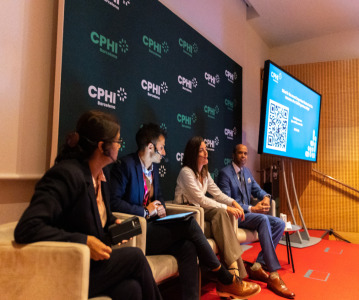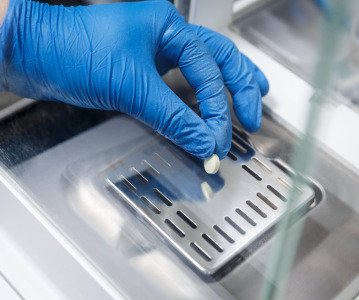GSK forms partnership with Vodafone to help increase childhood vaccination in Mozambique
GSK has formed a partnership with Vodafone to harness innovative mobile technology to help vaccinate more children against common infectious diseases in Africa.
GSK has formed a partnership with Vodafone to harness innovative mobile technology to help vaccinate more children against common infectious diseases in Africa. Despite major advances in the funding and availability of vaccines worldwide, it is estimated that up to a fifth of children worldwide still do not receive basic vaccines. The proliferation of mobile phones in Africa offers an opportunity to create innovative and cost-effective ways to address barriers to universal vaccination.
The initial focus of the new partnership will be a one-year pilot vaccination project in Mozambique, supported by Save the Children and run in collaboration with the Mozambique Ministry of Health. This project aims to establish if mobile technology solutions could increase the proportion of children covered by vaccination in Mozambique by an additional 5-10% through helping to encourage mothers to take up vaccination services, support health workers, improve record keeping, and enable better management of vaccine stock.
If successful, the project will create a model that can be replicated throughout Mozambique and then scaled across Africa to reach thousands more children with life-saving vaccination.
Sir Andrew Witty, CEO of GSK, said: "Innovative technologies - whether mobile devices, medicines or vaccines - are helping to transform global health. Organisations such as UNICEF and GAVI have played a key role in making vaccines much more accessible in Africa but barriers still exist which stop children from benefitting from basic immunisation. This new partnership combines GSK's expertise, knowledge and resources with those of Vodafone with the potential to deliver life-saving vaccines to tens of thousands more children in Mozambique. Our hope is that together we will create a sustainable and scalable model which could ultimately be replicated to help more children live healthy lives across developing countries."
Vittorio Colao, CEO of Vodafone, said: "Vodafone is committed to investing in mobile technologies that can transform healthcare in both developed and emerging markets. These partnerships have the potential to save millions of children’s lives in some of the world's poorest countries and we are delighted to support this critically important endeavour."
The pilot will use mobile technology to address barriers to increased take-up of vaccines in Mozambique in three key ways:
Mothers and caregivers will be registered on a Mozambique Ministry of Health database and alerted by SMS to the availability and importance of lifesaving vaccinations against common childhood diseases. Mothers will be able to schedule vaccination appointments by SMS and receive notifications of past and future vaccinations to ensure children complete the full schedule and become fully immunised.
Health workers will be provided with smartphones with software allowing them to contact mothers, view and record vaccination histories, schedule vaccinations and report on follow-up visits.
Healthcare facilities will be prompted to regularly report on crucial vaccination stock levels by SMS. This will enable critical supply chain management and the availability of vaccines when and where they are needed, particularly in rural areas.
The pilot will include up to 100 clinics and will be independently tested to prove its impact, effectiveness and cost benefits. To ensure open access, the platform will be available to caregivers across any mobile network and can be used to increase take-up of any selected vaccine.
GSK is a global healthcare company with a long history in the developing world. Its vaccines are included in immunisation campaigns in 173 countries worldwide and of the 1.1 billion vaccine doses delivered in 2011, 870 million doses (more than 80%), were shipped for use in developing countries.
In 2010, GSK created the dedicated Developing Countries and Market Access operating unit which is focused on expanding access to medicines for people in the world's poorest countries. In least developed countries, GSK focuses on increasing the volume of medicines supplied rather than revenue generated. It caps the prices of GSK patented medicines and vaccines at no more than 25% of developed world prices and reinvests 20% of profits back into projects that strengthen healthcare infrastructure in these countries.
Vodafone is one of the world's largest mobile communications companies. It has experience of developing commercial mobile health solutions in other African countries: 5,000 clinics across Tanzania currently use Vodafone's mobile stock management service to track malaria treatments and more than 1,800 remote community healthcare workers in South Africa are using a mobile solution to access and update patient records.
Today's announcement adds to GSK initiatives aimed at using mobile technology to improve healthcare in Africa:
Since 2011, GSK has been involved in an initiative using mobile technology to help tackle the issue of counterfeit medicines in Africa where 10-30% of all medicines sold are thought to be counterfeit. In collaboration with the National Agency for Food and Drug Administration Control (NAFDAC) in Nigeria, GSK introduced packs of antibiotics which contain a scratch-off panel that reveals a unique code which can sent by text message to verify a product as genuine. Following this successful pilot, NAFDAC has now mandated that a similar technology be applied to all antibiotics and anti-malarials in Nigeria from next year. GSK is introducing similar programmes in Kenya and Tanzania, with the hope to scale up across East Africa.
In Rwanda, GSK has formed a partnership with the private enterprise One Family Health (OFH) Foundation, Ecobank and the Rwandan Ministry of Health to establish up to 250 health posts across Rwanda over the next three years. Funded through low-interest loans, community nurses set up their own clinics in areas of low healthcare infrastructure to deliver essential medicines and basic healthcare in remote locations. Nurses are provided with internet-enabled mobile phones allowing them to access patient records and monitor stocks of medicines in real-time. This innovative approach not only increases access to healthcare but also provides a sustainable income for the healthcare workers involved.
GlaxoSmithKline - one of the world's leading research-based pharmaceutical and healthcare companies - is committed to improving the quality of human life by enabling people to do more, feel better and live longer.
Related News
-
News Women in Pharma: Our hopes for 2025 and beyond
Our last instalment for 2024 of the Women in Pharma series brings you messages direct from the Informa Markets CPHI team as they discuss the advice and insights they have carried throughout their roles working at CPHI, and what they hope to see for the... -
News CPHI Milan 2024 - From the Floor
Milan and CPHI welcome you to 2024 CPHI Milan! As we celebrate the 35th edition of our flagship CPHI show, editors Vivian Xie and Lucy Chard bring you the latest from the show floor, conference sessions, and innovative solutions from all exhibitors, at... -
News The BIOSECURE Act: implications for the pharma supply chain
On September 9, 2024, the US House of Representatives voted to pass the bill titled the BIOSECURE Act (the Act), which lists several Chinese companies in the pharmaceutical supply chain. The Act will prohibit American companies from contracting or doin... -
News A Day in the Life of a Global CDMO Chapter Lead – Manufacturing
The 'Day in the Life of' series has covered many aspects of the pharmaceutical pipeline, including R&D and procurement, now we're taking a look at manufacturing from a global CDMO perspective. -
News CPHI Milan Speaker Spotlight: CDMO relations with Pharma and Start-Ups
In the run-up to CPHI Milan, we sit down with some of the experts and thought-leaders speaking at this year’s conferences. -
News Women in Pharma: Advocating for trans healthcare in pharma
In our monthly series on women in the pharmaceutical industry, we interview leading experts in the pharmaceutical supply and value chain to discuss the importance of gender diversity in healthcare, the workplace, and beyond. -
News Updated – Changing abortion pill access according to the US FDA and Supreme Court
After the approval of the medical abortion pill, mifepristone, by the US FDA, states across the USA approach the distribution of the pill differently, some ruling against allowing access to the drug. -
News CPHI North America 2024 – From the Floor
Welcome to Philly! CPHI North America once again graces the Philadelphia Convention Center, 7–9 May 2024.
Recently Visited
Position your company at the heart of the global Pharma industry with a CPHI Online membership
-
Your products and solutions visible to thousands of visitors within the largest Pharma marketplace
-
Generate high-quality, engaged leads for your business, all year round
-
Promote your business as the industry’s thought-leader by hosting your reports, brochures and videos within your profile
-
Your company’s profile boosted at all participating CPHI events
-
An easy-to-use platform with a detailed dashboard showing your leads and performance
.png)




.png)

